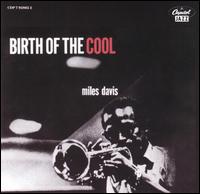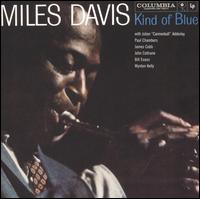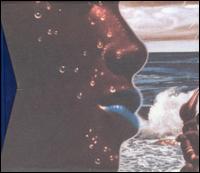The All-Time Mabee Top Ten: Miles Davis Trifecta
 Birth of the Cool / Miles Davis
Birth of the Cool / Miles DavisM1366.D38 B57 2001
So dubbed because these three sessions — two from early 1949, one from March 1950 — are where the sound known as cool jazz essentially formed, The Birth of the Cool remains one of the defining, pivotal moments in jazz. This is where the elasticity of bop was married with skillful, big-band arrangements and a relaxed, subdued mood that made it all seem easy, even at its most intricate. After all, there's a reason why this music was called cool; it has a hip, detached elegance, never getting too hot, even as the rhythms skip and jump. Indeed, the most remarkable thing about these sessions — arranged by Gil Evans and featuring such heavy-hitters as Kai Winding, Gerry Mulligan, Lee Konitz, and Max Roach — is that they sound intimate, as the nonet never pushes too hard, never sounds like the work of nine musicians. Furthermore, the group keeps things short and concise (probably the result of the running time of singles, but the results are the same), which keeps the focus on the tones and tunes. The virtuosity led to relaxing, stylish mood music as the end result — the very thing that came to define West Coast or "cool" jazz — but this music is so inventive, it remains alluring even after its influence has been thoroughly absorbed into the mainstream. ~Stephen Thomas Erlewine, All Music Guide

Kind of Blue / Miles Davis
M1366.D38 K5 1987
M1366.D38 K5 1987
Kind of Blue isn't merely an artistic highlight for Miles Davis, it's an album that towers above its peers, a record generally considered as the definitive jazz album, a universally acknowledged standard of excellence. Why does Kind of Blue posses such a mystique? Perhaps because this music never flaunts its genius. It lures listeners in with the slow, luxurious bassline and gentle piano chords of "So What." From that moment on, the record never really changes pace — each tune has a similar relaxed feel, as the music flows easily. Yet Kind of Blue is more than easy listening. It's the pinnacle of modal jazz — tonality and solos build from the overall key, not chord changes, giving the music a subtly shifting quality. All of this doesn't quite explain why seasoned jazz fans return to this record even after they've memorized every nuance. They return because this is an exceptional band — Miles, Coltrane, Bill Evans, Cannonball Adderley, Paul Chambers, Jimmy Cobb — one of the greatest in history, playing at the peak of its power. As Evans said in the original liner notes for the record, the band did not play through any of these pieces prior to recording. Davis laid out the themes before the tape rolled, and then the band improvised. The end results were wondrous and still crackle with vitality. Kind of Blue works on many different levels. It can be played as background music, yet it amply rewards close listening. It is advanced music that is extraordinarily enjoyable. It may be a stretch to say that if you don't like Kind of Blue, you don't like jazz — but it's hard to imagine it as anything other than a cornerstone of any jazz collection. ~Stephen Thomas Erlewine, All Music Guide
Watch a clip from 1958 of Miles Davis and John Coltrane performing "So What":
 The Complete Bitches Brew Sessions / Miles Davis
The Complete Bitches Brew Sessions / Miles DavisM1366.D38 B582 1998
Columbia's continuing summation of the career of Miles Davis through lavish box-set reissues resumed in 1998 with The Complete Bitches Brew Sessions, a four-disc set including all the music from the original 1970 double-album Bitches Brew plus over two additional hours of music from the six-month period during which the album was recorded. (Some of those tracks were previously released on compilations like Big Fun and Circle in the Round, but almost one-third of the material lay unissued until this release.) The music is simply fabulous — the simultaneous birth and peak of jazz-rock/fusion, with a host of major players (John McLaughlin, Chick Corea, Joe Zawinul, Wayne Shorter, Jack DeJohnette) and many innovations. There is a bit more evidence of tape hiss than in Columbia's last American remastering of the album, but the revelations of depth and timbre more than make up for it. Though the unreleased selections are distinctly inferior to those released on Bitches Brew, "Yaphet," "Corrado," and "Trevere" are intriguing jam sessions that reveal much about the creative process between Davis and producer Teo Macero during recording. Unlike Columbia's previous sets in the series (one treating Miles' period of collaboration with Gil Evans and one featuring the music of his second classic quintet), the Bitches Brew sessions lend themselves well to a box set of this type — presenting the music in chronological order does no harm to original LP configurations as it did on previous sets, and the music here is another glowing testament to Miles' importance to the development of jazz in 1969, as in 1949. ~John Bush, All Music Guide
Listen to the title track from the album Bitches Brew
0 Comments:
Post a Comment
<< Home